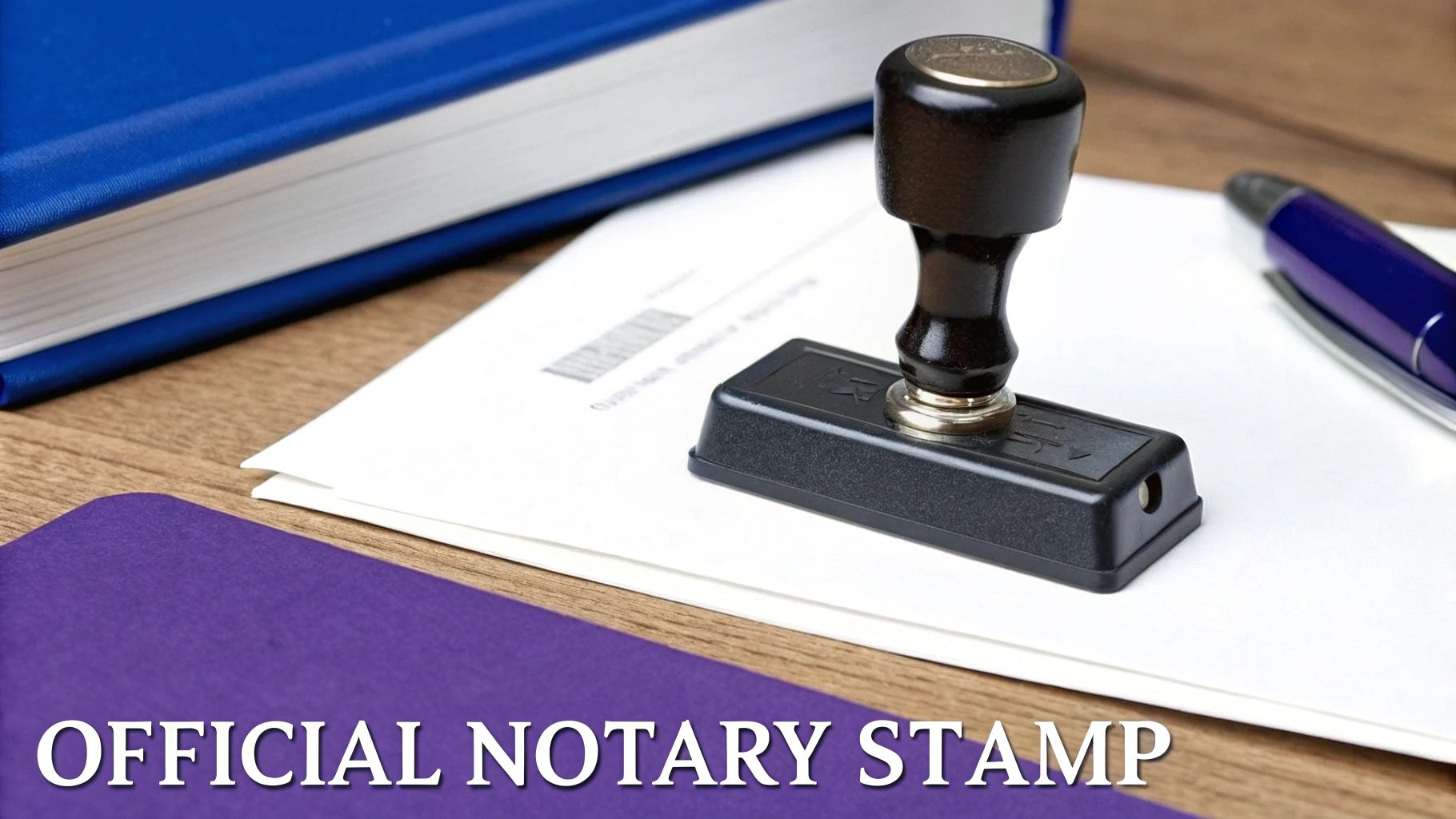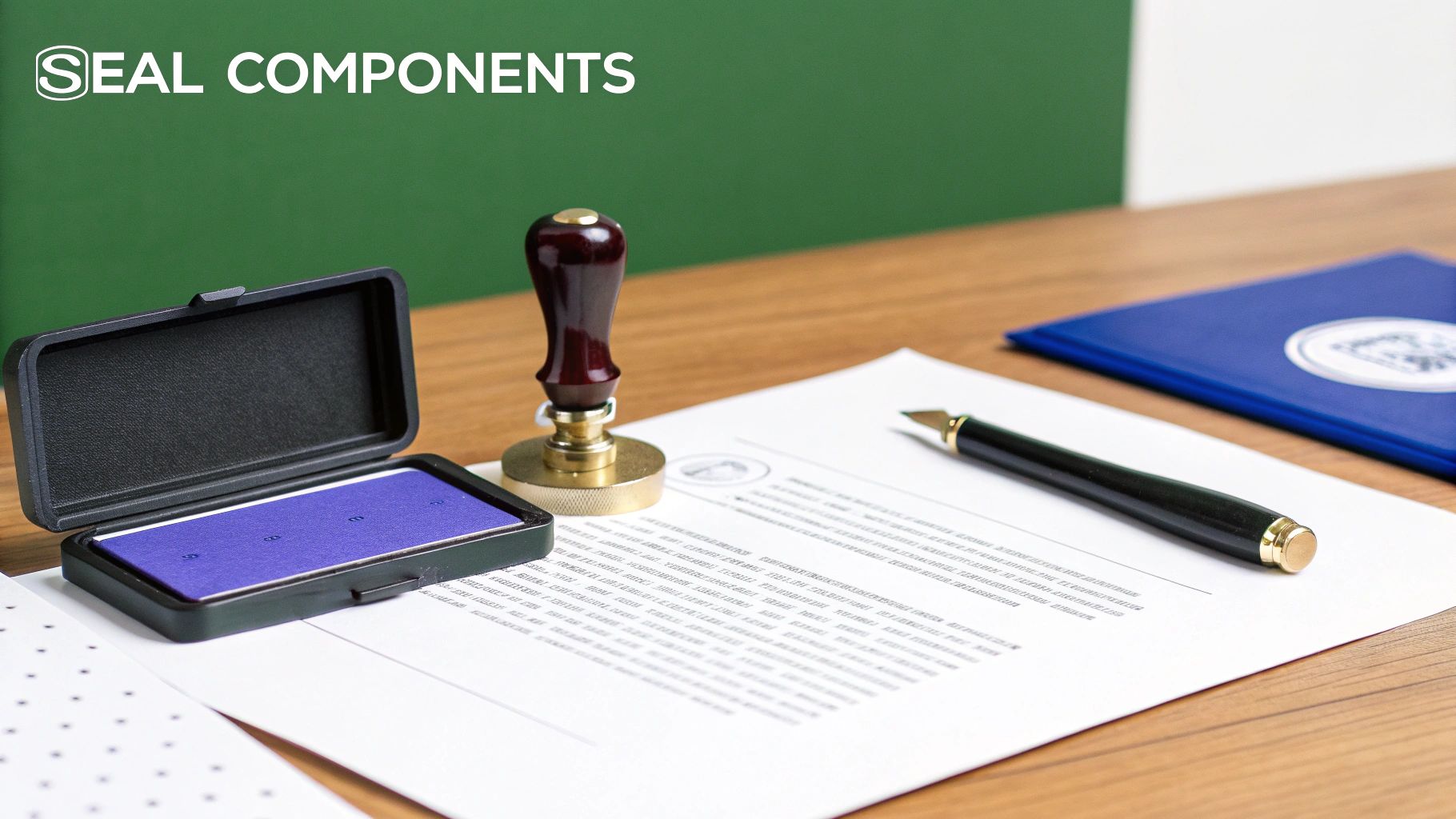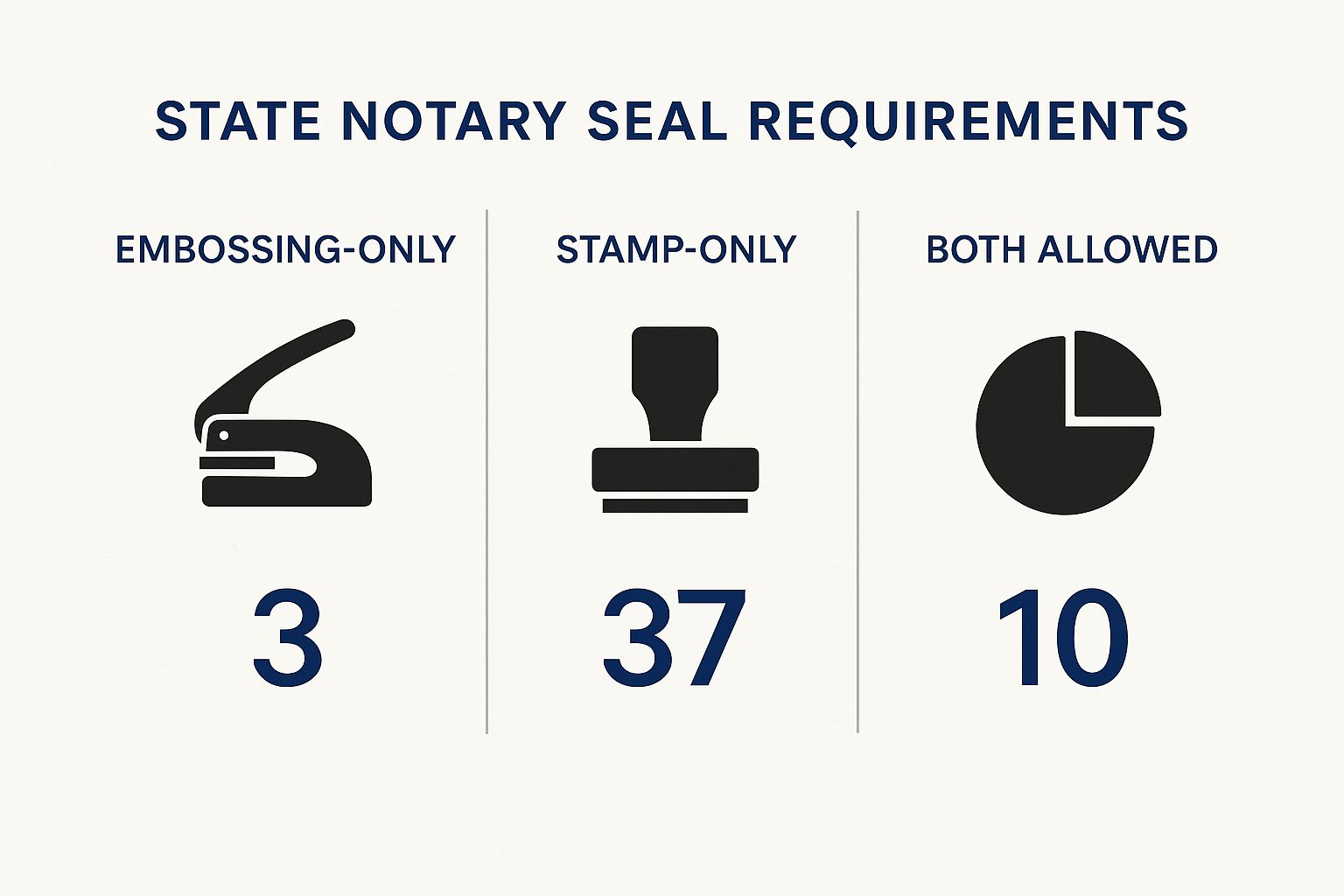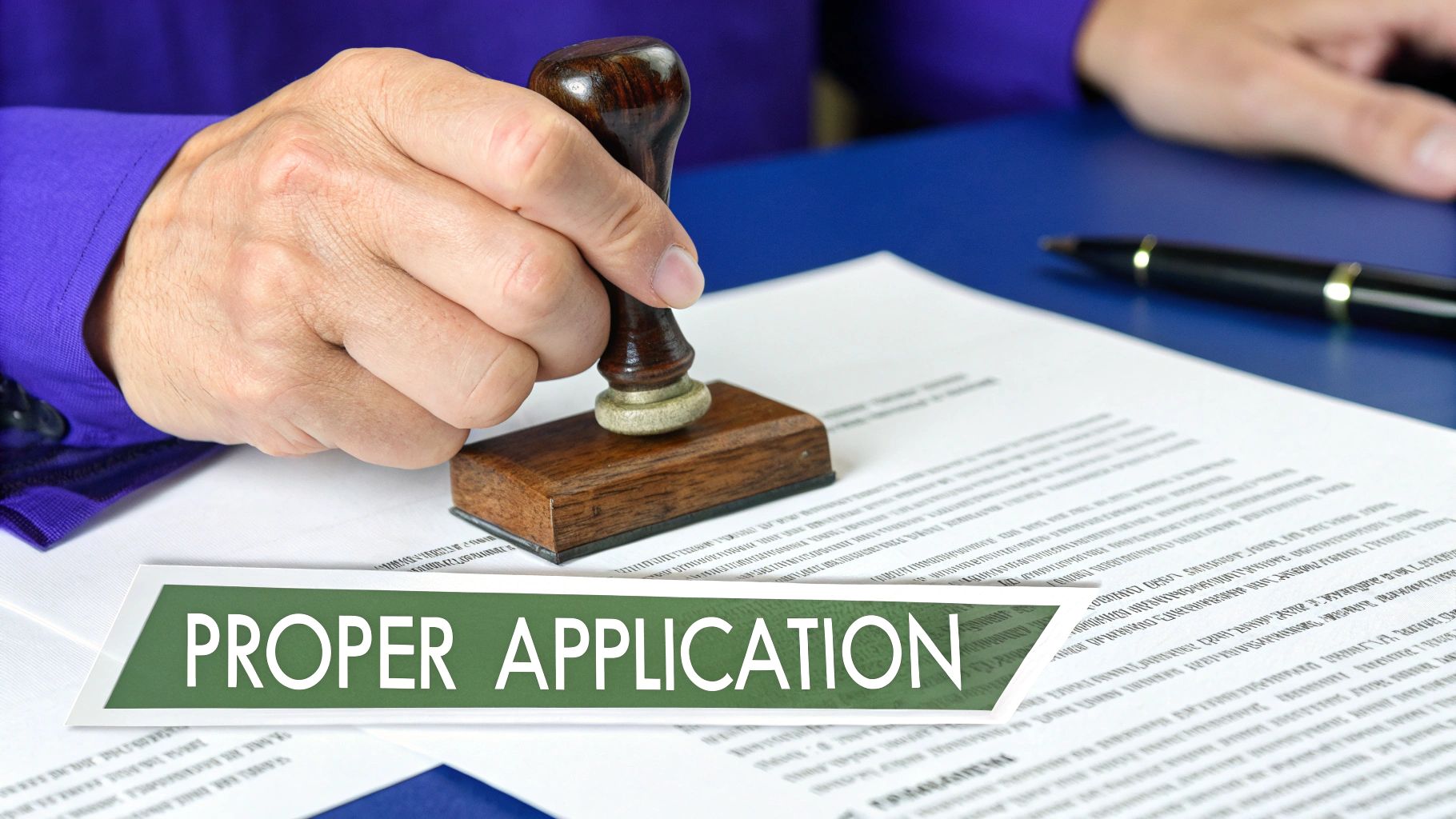What Is a Notary Seal? Essential Facts You Need to Know
- WebsiteFix Technical Partner
- Aug 11
- 10 min read
A notary seal is more than just an impression on a piece of paper. It's the official mark that a commissioned notary public uses to show they've done their job—verifying a signer's identity and witnessing the signature. Think of it as a physical or digital guarantee that transforms a standard document into a legally respected instrument, a process now available through convenient online and mobile services.
This seal is the ultimate symbol of trust in countless legal and business transactions.
The Official Mark of Document Integrity

You can think of a notary seal as your document’s official badge of honor. When courts, government agencies, or business partners see that mark, it signals that a commissioned professional has properly handled the notarization. That simple act of stamping or digitally affixing the seal is what gives a document its legal weight and helps shut the door on fraud.
Every seal is unique, containing specific details like the notary's name and commission information. This makes each notarization completely traceable and holds the notary accountable for their work. While the traditional ink stamp is still common, the methods for applying this mark of integrity have evolved significantly, making it easier than ever to get documents notarized.
Modern Solutions for Modern Needs
The fundamental need for document authentication hasn't gone anywhere, but the ways we achieve it have certainly changed. Today’s services are all about bringing the notary to you, whether that’s to your physical location or right to your computer screen, often as part of comprehensive document preparation solutions.
Remote Online Notarization (RON): This innovative virtual service connects you with a notary through a secure video conference. The notary applies a tamper-evident digital seal, offering incredible security and unmatched convenience for your documents from anywhere.
Mobile Notary Services: If you prefer a face-to-face meeting, a mobile notary can travel to your home, office, or another agreed-upon location. It’s the perfect blend of traditional practice and modern flexibility, bringing the service directly to your doorstep.
The notary seal is a powerful tool with several key responsibilities. I've broken down its main roles in this table.
Core Functions of a Notary Seal at a Glance
Function | Description |
|---|---|
Authentication | Confirms the notary is a legitimate, commissioned public official. |
Verification | Signifies that the signer’s identity has been properly verified by the notary. |
Fraud Deterrence | The unique, traceable information on the seal discourages forgery and fraud. |
Legal Validity | Provides the document with the necessary legal standing for official use. |
Ultimately, these functions work together to protect the integrity of the document and everyone involved.
The core function of any notary seal—physical or digital—is to provide indisputable proof that a document has been properly executed and witnessed by an impartial third party. This is the foundation of document security.
So, whether you're getting a document notarized from your desk through a virtual service or need a mobile professional to meet you on short notice, these modern options ensure your paperwork is legally sound without all the old-fashioned hassle.
Tracing the Seal from Wax Imprints to Digital Icons

To really grasp the security and speed of modern notarization, it helps to look back at where the notary seal came from. This idea of using an official mark to make a document trustworthy isn't a recent invention; its roots go back centuries, to a time when trust was literally pressed into paper.
Think back to the Middle Ages. Notaries were formalizing their roles, using their authority to authenticate critical documents like wills and property deeds. Their tool of choice? A heavy metal seal, which they would press into melted wax. This created a raised, unique impression that was incredibly difficult to forge.
These intricate seals became a tangible symbol of a document's authenticity and the notary's impartiality. For a deeper dive into this fascinating history, NotaryJane.com offers some great insights into the seal's early evolution.
As trade routes expanded during the Renaissance, these seals became indispensable. An official, verifiable mark was essential to ensure contracts were honored across borders. The core need for an impartial third party to witness and validate transactions proved to be timeless.
From Ink to Pixels: The Modern Evolution
The first big jump in technology was moving from clunky wax impressions to simple ink stamps. This made the notarization process much faster and made documents far easier to stack and file. That practical shift from wax to ink really set the stage for the next major leap: the digital seal, which powers today's virtual services. The fundamental purpose hasn't changed, but the methods have become worlds more convenient.
Today, this long history has led us to a mixture of powerful modern notarization services:
Mobile Notary Services: This is a nod to tradition with a layer of convenience. A notary public comes to your location—your home, office, or even a coffee shop—to witness your signature and apply their physical ink seal to your documents. It's an ideal choice for complex signings.
Remote Online Notarization (RON): As the latest step in this evolution, this virtual service uses a secure, encrypted digital seal. A notary can legally authenticate your documents over a live video call, providing incredible flexibility without sacrificing an ounce of security.
This journey from wax to pixels shows just how adaptable the notary seal is. It has consistently evolved to meet the demands of the day, ensuring its vital role in commerce and law continues seamlessly through mobile and online services.
Decoding the Modern Notary Seal
Think of a notary seal not just as a rubber stamp, but as a powerful symbol of trust and authenticity. It’s the official mark that transforms a regular document into a legally binding one. Every detail on that seal is there for a reason, meticulously regulated by the state to fight fraud and confirm the notary's authority.
It’s these legally mandated details that give a simple ink stamp or embosser its real power. Without them, it's just a piece of office equipment. With them, it's an instrument of verification, available through both traditional and virtual channels.
Key Components of a Notary Seal
So, what information turns a stamp into a seal? While the exact requirements can differ from state to state, almost all of them demand a few core elements:
The Notary Public's Name: This must be printed exactly as it appears on their official commission. No nicknames or abbreviations.
The Commission Number: A unique ID number the state assigns to each notary. It’s like a serial number for their commission.
The State of Commission: The specific state where the notary is legally permitted to perform their duties.
The Commission Expiration Date: This is crucial because it clearly shows the public how long the notary's commission is valid.
This visual breakdown gives you a great snapshot of how different states handle their seal requirements.

As you can see, the ink stamp is the overwhelming favorite. Why? Because an embossed seal can be difficult to see on a photocopy or a scan, which is a major drawback in our modern, document-imaging world. An ink stamp, on the other hand, shows up crisp and clear.
Digital Seals in Online and Mobile Notary Services
Now, let's talk about the digital world, where online services excel. The same core principles of security and verification carry over to Remote Online Notarization (RON), but the tool itself is different. Instead of ink on paper, a digital seal is an encrypted electronic signature that is securely attached to the digital document.
It typically contains all the same information as its physical counterpart—name, commission number, and so on—but with powerful layers of digital security built right in, making virtual notarization a leading-edge solution.
A digital seal isn’t just an image. It’s cryptographically linked to the document. If anyone tries to alter the document even slightly after it's been notarized, the seal will immediately show that it has been tampered with. This makes the document tamper-evident and provides a level of security that's hard to beat.
This evolution from a physical stamp to a secure digital mark is a huge part of what makes online notary services so effective. If you're curious about the process, you can find a great walkthrough on how to get something notarized in the digital age. The combination of convenience and security is truly changing the game.
Physical Seal vs. Digital Seal: A Modern Comparison
The transition from traditional to remote notarization has created two distinct types of seals, each used in different service models—mobile and online. Here's a quick look at how they stack up.
Feature | Physical Notary Seal | Digital Notary Seal (RON) |
|---|---|---|
Format | Ink stamp or embosser applied to paper. | Encrypted electronic image attached to a digital file. |
Security | Visual verification; relies on the integrity of the paper. | Tamper-evident; cryptographically secured. |
Verifiability | Checked against a state's public notary database. | Instantly verifiable through its digital certificate. |
Vulnerability | Susceptible to forgery, damage, or loss. | Highly resistant to forgery; cannot be lost or damaged. |
Ultimately, both seals serve the same fundamental purpose: to verify the notary's identity and the act of notarization. The digital seal, however, is purpose-built for our increasingly digital lives, offering a more robust and secure solution through remote online services.
Why the Notary Seal Is Your Document’s Best Defense
When you get right down to it, a notary seal is more than just a rubber stamp or a fancy impression. It's your document's first line of defense against fraud, acting as a powerful security feature that locks everything in place.
By creating a clear, verifiable connection between the person signing and the paper they’re signing, the seal makes it incredibly difficult for anyone to come along later and tamper with the document or forge a signature. It’s a simple concept with profound implications.
This is precisely why notarized documents carry so much weight in legal situations. The presence of a valid notary seal provides what's known in the legal world as prima facie evidence. This fancy term simply means a court will assume the document is authentic just by looking at it. The burden of proof then shifts to anyone who dares to claim otherwise.
The Real-World Impact of a Valid Seal
Think about the high-stakes moments in life—signing a power of attorney, finalizing a will, or closing on your first home. In these situations, there's zero room for error. A missing or improperly applied seal can render the entire agreement invalid, potentially derailing your plans and leading to expensive, drawn-out legal fights. Professional mobile and remote online notary services are designed to prevent these exact issues.
To get a better handle on why this process is so fundamental, you can explore this guide on **unlocking the power of notarization**.
Even as the world goes digital, the core function of the seal remains unchanged. Traditionally, you'd see an inked stamp or a raised, embossed seal. Today, with the rise of Remote Online Notarization (RON), that physical mark has evolved into secure digital seals. You can learn more about the fascinating evolution of notary practices worldwide to see how this centuries-old role has adapted.
No matter how it's done—through a mobile notary at your office or a virtual session online—ensuring your document has a valid seal is absolutely non-negotiable if you want it to be protected.
Notarization on Your Terms with Online and Mobile Services

Remember the old days of frantically searching for a notary's office and then rushing to get there before they closed? Thankfully, that's largely a thing of the past. Modern notarization has evolved, putting you in the driver's seat with services that fit your schedule, not the other way around.
The biggest game-changer has been the rise of virtual and mobile notary solutions. This includes everything from remote online notarization to mobile services that come to you, often bundled with document preparation assistance.
The Power of Digital and Mobile Convenience
The advantages here are about more than just avoiding traffic. Today's notary services deliver a better experience by focusing on both top-notch security and genuine flexibility, letting you pick what works for you.
Remote Online Notarization (RON): This is the fully virtual route. It uses powerful identity verification tools and special tamper-evident technology. Instead of an ink stamp, the notary applies a secure digital seal that’s cryptographically bound to the document, making it far tougher to forge than a traditional signature.
Mobile Notary Services: If you still want that face-to-face interaction or need assistance with document preparation, a mobile notary will come directly to you. This is the perfect blend of traditional practice and modern convenience, ideal for things like real estate closings or handling sensitive family estate documents.
One of the most significant benefits, especially with RON, is the creation of a solid audit trail. Every online session is recorded and stored, providing clear, indisputable proof of the notarization. This offers a layer of accountability that simply doesn't exist with a quick, in-person stamp.
So, whether you need a document finalized from your kitchen table via a remote session or a professional to meet you at the office after hours, modern notarization adapts to you. It provides secure, legally recognized notarizations that fit your life, expanding our understanding of what a notary seal is to include both traditional ink and protected digital credentials.
Answering Your Top Questions About Notary Seals
When you're dealing with important documents, the world of notarization can seem a bit complex, especially with new technology changing the game. Let's clear up a few of the most common questions people have about notary seals.
First off, are a notary stamp and a notary seal the same thing? Yes, in everyday use, these terms mean the same thing. They both refer to the official ink device a notary presses onto a document. This ink-based method is still the most common because it shows up clearly on photocopies and scans, which is crucial for good record-keeping.
Can I Really Get a Document Notarized from Home?
Absolutely. Gone are the days of having to track down a notary's office during business hours. Modern services have made notarization incredibly convenient, bringing the notary directly to you—either in person or through your screen.
Here are the two main ways this works:
Mobile Notary Services: A commissioned notary public travels to a location you choose, whether it's your home, office, or even a coffee shop. This is perfect for when you prefer a face-to-face meeting or have complex documents to sign.
Remote Online Notarization (RON): This is the ultimate virtual option. You connect with a notary using a secure audio-video call. From anywhere in the world, you can get your documents notarized in minutes as the notary applies their secure digital seal.
You might be surprised to learn that a digital notary seal used in RON is often more secure than a traditional ink one. It's tied to a unique digital certificate that essentially locks the document. If anyone tries to alter the file after it's been notarized, the digital seal will visibly break, immediately flagging the document as tampered with. This offers a powerful defense against fraud.
This added security is a game-changer for high-stakes documents. For example, when learning how to notarize a Power of Attorney, you'll see just how vital this trust is. A missing or invalid seal—whether digital or physical—can get your document flat-out rejected by courts or government agencies, causing serious headaches and delays. A professional mobile or remote notary is trained to ensure this critical step is done right every time, protecting the integrity of your agreements.
Need a document notarized on your schedule? Signature on Demand offers both mobile and remote online notary services to provide the ultimate convenience and security. Whether you need a notary to come to you or prefer to complete the process online, we have you covered. Visit us at https://signatureondemand.net to book your appointment today.







Comments